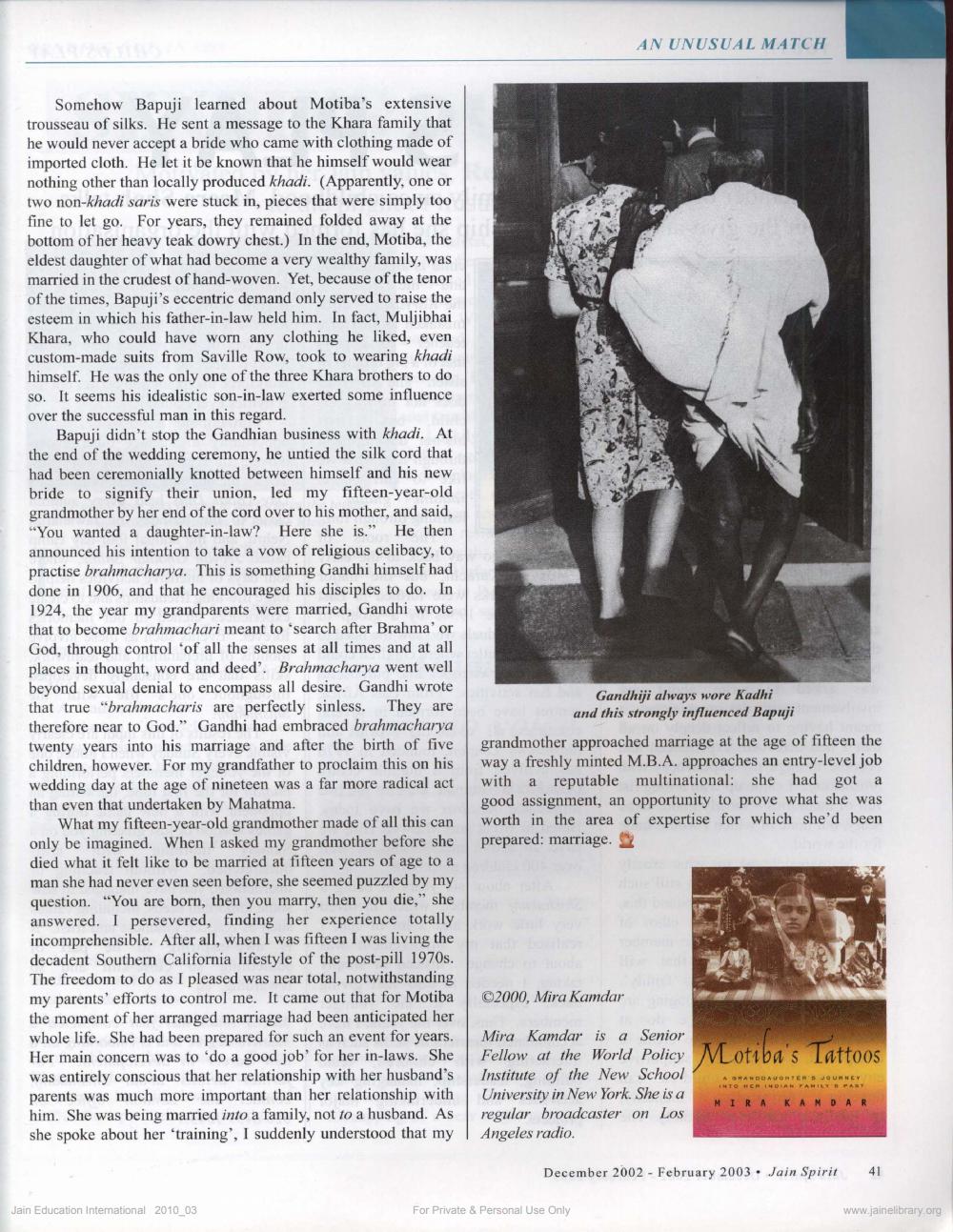________________
AN UNUSUAL MATCH
Somehow Bapuji learned about Motiba's extensive trousseau of silks. He sent a message to the Khara family that he would never accept a bride who came with clothing made of imported cloth. He let it be known that he himself would wear nothing other than locally produced khadi. (Apparently, one or two non-khadi saris were stuck in, pieces that were simply too fine to let go. For years, they remained folded away at the bottom of her heavy teak dowry chest.) In the end, Motiba, the eldest daughter of what had become a very wealthy family, was married in the crudest of hand-woven. Yet, because of the tenor of the times, Bapuji's eccentric demand only served to raise the esteem in which his father-in-law held him. In fact, Muljibhai Khara, who could have worn any clothing he liked, even custom-made suits from Saville Row, took to wearing khadi himself. He was the only one of the three Khara brothers to do so. It seems his idealistic son-in-law exerted some influence over the successful man in this regard.
Bapuji didn't stop the Gandhian business with khadi. At the end of the wedding ceremony, he untied the silk cord that had been ceremonially knotted between himself and his new bride to signify their union, led my fifteen-year-old grandmother by her end of the cord over to his mother, and said, “You wanted a daughter-in-law? Here she is." He then announced his intention to take a vow of religious celibacy, to practise brahmacharya. This is something Gandhi himself had done in 1906, and that he encouraged his disciples to do. In 1924, the year my grandparents were married, Gandhi wrote that to become brahmachari meant to search after Brahma' or God, through control of all the senses at all times and at all places in thought, word and deed'. Brahmacharya went well beyond sexual denial to encompass all desire. Gandhi wrote
Gandhiji always wore Kadhi that true "brahmacharis are perfectly sinless. They are
and this strongly influenced Bapuji therefore near to God.” Gandhi had embraced brahmacharya twenty years into his marriage and after the birth of five grandmother approached marriage at the age of fifteen the children, however. For my grandfather to proclaim this on his way a freshly minted M.B.A. approaches an entry-level job wedding day at the age of nineteen was a far more radical act with a reputable multinational: she had got a than even that undertaken by Mahatma.
good assignment, an opportunity to prove what she was What my fifteen-year-old grandmother made of all this can worth in the area of expertise for which she'd been only be imagined. When I asked my grandmother before she prepared: marriage. died what it felt like to be married at fifteen years of age to a man she had never even seen before, she seemed puzzled by my question. "You are born, then you marry, then you die," she answered. I persevered, finding her experience totally incomprehensible. After all, when I was fifteen I was living the decadent Southern California lifestyle of the post-pill 1970s. The freedom to do as I pleased was near total, notwithstanding my parents' efforts to control me. It came out that for Motiba ©2000, Mira Kamdar the moment of her arranged marriage had been anticipated her whole life. She had been prepared for such an event for years. Mira Kamdar is a Senior Her main concern was to do a good job' for her in-laws. She Fellow at the World Policy M otiba's Tattoos was entirely conscious that her relationship with her husband's Institute of the New School parents was much more important than her relationship with University in New York. She is a him. She was being married into a family, not to a husband. As regular broadcaster on Los she spoke about her "training', I suddenly understood that my | Angeles radio.
ORADEAWORTER JOURNEY
MIRAKA
December 2002 - February 2003 . Jain Spirit
41
Jain Education International 2010_03
For Private & Personal Use Only
www.jainelibrary.org




